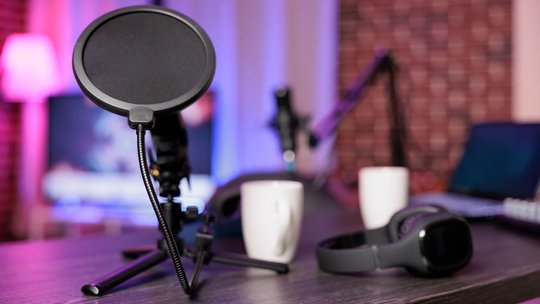Blog
Podcasts for Content Marketing: Your Ultimate Guide

Published 18/11/2024 by Babalola Alabi
PodcastingContent marketing is a broad topic which extends beyond creating blog posts, infographics, and social media content.
Other content types also fall under the content marketing umbrella, and one of the most exciting and popular ones is podcasts. Podcasts are unique tools to fill up the audio aspect of your content marketing strategy and offer your brand an opportunity to have a deeper connection with your audience.
In this guide, we will discuss the inclusion of podcasts in content marketing strategies, the right approach, and how to start a branded podcast.
Podcasting and Content Marketing: Their Meanings and How They Work
Content marketing is one of the most used terms in marketing and branding. It is the strategic process of creating and sharing valuable content with your audience. However, content marketing has improved beyond creating blogs, social media, and other written content. It now extends to creating audio and video content, which are the most consumed content types in the 21st century.
On the other hand, podcasting is an increasingly popular medium for reaching and engaging audiences through audio content. Like written content, a well-composed and strategically curated podcast can help brands connect with their audience. Podcasts also integrate visual elements, as video podcasts open up new storytelling possibilities for your audience.
Why should you Consider Podcasting in your Content Marketing Strategy?
The podcast industry is growing significantly, and most businesses are now adding podcasts to their weekly and monthly content plans to get great results. There are several reasons to consider it a strategy for your brand, and some of them include the following:
Multichannel content creation
Podcast episodes are one of the best content to re-purpose easily. How? They fuel other content channels, such as blog posts, social media updates, and email newsletters. When you create a podcast episode, you can convert the audio to video for your social media content or create clips from the video using clip generators like SoundMadeSeen for social media platforms like TikTok, YouTube Shorts and Instagram. This method expands its reach and maximizes the effort of content creation.
Building Brand Authority
Every business has a competitor, and one way to stay ahead of them and become relevant is by building authority. Podcasts allow your brand to discuss areas of expertise, share industry insights, and host guests to share their knowledge. Doing this consistently positions your brand as a knowledgeable authority and builds trust and credibility with the listeners.
Reaching New Audiences
Your listeners and viewers are in places wider than you think, and some might not like reading a text or blog post to learn about you and your brand. Audio and video podcasts offer a fresh way to reach audiences who prefer audio content, gain new leads and meet people who might not engage with the traditional written content. Leads could come through collaboration with other podcasters or your podcast guest. For instance, when a guest shows up on your podcast, their audience would be directed and attracted to the content, and some might eventually become loyal fans.
What makes a Good Podcast?
A good podcast offers a combination of compelling content, attractive storytelling, high-quality production, and audience engagement. To achieve these, there are key elements that contribute to the entire process:
- Valuable content: Your podcast content becomes valuable when meaningful, engaging, and relevant to your audience. While offering insights and discussing the topic, remember to speak from a unique perspective and include actionable takeaways your audience can use.
- Engaging podcast format: A good podcast has a structured flow with well-organized episodes, a clear introduction, main content, and a strong conclusion. It also maintains variety in other podcast segments and hooks the audience with a conversational tone between the host and the guest.
- Quality production: Good sound quality is essential for any podcast to flourish. Quality production includes seamless transitions, clean cuts, appropriate music or sound effects, and consistent volume levels. For video podcasts, having a clear video with appropriate and consistent lighting should be included in the list.
- Strong host presence and authenticity: A good podcast has a confident host full of charisma and energy, knowledge of the topic of discussion, and the ability to provide value to the audience.
- Effective branding and promotion: Each episode should have a catchy title and description that grab your audience's attention and set clear expectations for them. It should also be actively promoted across all channels—social media, email newsletter, and podcast directories—with a visually appealing design that aligns with the podcast’s theme.
- Adaptability and growth: Finally, a good podcast is a podcast of the people, by the people, and for the people. It adapts and adjusts topics, formats, and strategies based on audience feedback and analytics. It also focuses on relevant trends, news, or events that resonate with the target audience.
How to Start a Podcast for your Business
Podcast content marketing is a great way to focus on providing value and connecting with your audience through storytelling, education, or entertainment. So, if you wish to start branded podcasting—or podcasting for brands and companies—then here is your ultimate guide:
1. Define your audience and podcast goals
Before starting your podcast, it is vital to clearly outline why you're starting the podcast, who your audience is, and what to expect from podcasting.
Usually, your audience is your customers; whatever content you create should relate to them. However, there are other things to discover about your audience to create the right content for them successfully. You could start by asking questions like:
- Who are they? Define demographics (age, profession, interests).
- What are their challenges? (Helps you create episodes that solve problems or inspire them).
- What type of content do they enjoy? (Casual conversations, in-depth tutorials, or entertaining stories?)
Besides your audience, you also need to define your podcast goals.
- Why are you starting the podcast? Is it to raise brand awareness, establish expertise, tell stories, or educate your audience?
- What specific outcomes do you wish to get from it? Build a community? Generate leads? Or increase your website traffic?
These are the first things to consider before starting your podcast.
2. Plan Your Podcast Structure
After finalizing your podcast's goals, it's time to plan its structure. This involves choosing the right podcast format and designing a content strategy that could cover everything your audience wants to hear.
Podcast formats are of different structures:
- Interview Podcasts
- Storytelling Podcasts
- Educational or Instructional Podcasts
- Panel Discussion Podcasts
- Solo Podcasts
Choosing the one that best suits your brand, content, and audience is important.
Also, create a content strategy that contains the content plans, an outline of your podcast episode, topic series, guest appearances, or seasonal themes for variety. Experiment with different content types and topics, or check what your competitors do to make the right decisions.
Finally, decide how often you wish to release podcast episodes (weekly, bi-weekly, monthly) and the length of each episode.
3. Brand and Produce Your Podcast
Your podcast should reflect your brand's identity and maintain professional quality, so branding your podcast is important.
Focus on having a great first impression that captures the audience's attention. Start by:
- Choosing a memorable name that represents your brand and is easy to search.
- Create perfect art and designs for your podcast. This includes a logo for the profile picture, a banner, and thumbnails for your podcast episodes. Remember that they should align with your brand’s aesthetic, like color, tone of voice, and others.
- Select the best intro and outro music that sets the mood and boosts your brand tone.
In addition, invest in a good-quality podcast equipment kit. This helps you sound professional, attract more listeners, and improve the retention span of your audience. Some basic podcast equipment to consider having include:
- Microphones
- Headphones
- Camera (for a video podcast)
- Recording and editing software
- Shock mount
- Mic arm
Remember to perform technical checks on your equipment before recording your podcast episode.
You can check our ultimate guide to help you choose the right podcast equipment.
4. Promote and Optimize
After producing your first podcast episode, the next thing to do is promote and optimize it as much as possible.
Start by sharing your podcast on all podcast directories to reach out to all your audience on the different platforms. If you wish to run a video podcast, share your episode on platforms like YouTube to make it easy to access. Work on other promotion strategies like:
- Creating clips and audiograms in short, visually engaging snippets with SoundMadeSeen for social media platforms like Instagram Reels and TikTok.
- Creating behind-the-scene content to show how the podcast was made.
- Partnering and collaborating with influencers and other podcasters in the industry.
- Using email marketing to notify your audience of a new episode.
- Embedding episodes with show notes and relevant keywords into your website.
- Repurposing your transcript into blog content for those who love to read.
As you produce and promote your podcast, always track your performance metrics and pay attention to your audience's feedback to adjust your content and podcast structure to their needs and desires.
Finally, stick to a release schedule (e.g., every Tuesday) to keep your audience engaged and build loyalty.
FAQs on Podcast Content Marketing
Do podcasts work for marketing?
Yes! Podcasts work for marketing, especially when done strategically. They can be used to build brand awareness, connect with a niche audience, increase engagement and loyalty in a brand, or drive traffic and leads. It all depends on your goals and how you execute it.
What is a branded podcast?
A brand or company creates and produces a branded podcast to engage its audience, build brand awareness, or for other marketing and storytelling purposes.
Are podcasts part of content marketing?
Yes, podcasts are part of content marketing! Content marketing covers everything related to written, audio, or visual content and how to use it for marketing purposes.
Start creating for free
Turn your podcast, audiobook or talk into sharable video and text content
Try it today


